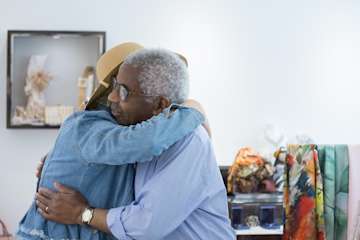
Talking about death and dying
Death is the one thing that all of us have in common. We will all die someday, and most of us will experience the death of a loved one at some point in our lives. Talking about death and dying can feel taboo, but openly talking about death can help calm feelings of anxiety and fear. By talking about death and dying now, you can ensure that someone’s end of life wishes are known and respected when they die.
Talking about death with family and friends for the first time can feel overwhelming. It’s completely normal to feel nervous about how someone might react or how the conversation might affect your relationship with them.
Brits are well-known for being reserved when it comes to these conversations. Historians believe British bereavement went through a big change after the First World War. The huge number of soldiers who died meant many families repressed their emotions and had to grieve in private, compared with the earlier Victorian public displays of grief.
In 2023, Co-op Funeralcare launched our biggest survey into death, dying and bereavement. It found that almost 58% of people surveyed consider the topic of death to be an ‘elephant in the room’. However, almost the same number (56%) also said that open conversations would allow them to discuss the issue more freely.
In our latest research, 50% of those surveyed said they hadn't discussed their funeral wishes with friends or family at all, and of those that had, only 17% had discussed the subject in detail.
It can be difficult to admit how the topic of death really makes us feel, avoiding the topic altogether. But it’s this anxiety that prevents us from preparing and avoiding these conversations all together that means important things can remain left unsaid.

Talk about your funeral wishes
At Co-op Funeralcare, we believe that talking now helps your loved ones later. Even knowing what song someone might like played can be a great help to a person who is grieving. Feeling like they’ve been able to do something for the person who has died can bring them comfort and peace of mind.
By not talking about your funeral wishes, you are leaving things for family and friends to decide at an already stressful and upsetting time. For example, imagine sitting down with a funeral arranger and answering whether your loved one would like to be buried or cremated. Deciding on someone’s final resting place is a difficult thing to do if you have no idea what they wanted. The pressure of making this decision can be avoided by talking about these things while you’re still alive.
But talking about your funeral wishes doesn’t only help your loved ones. It can help you too. If you’re planning for end of life, it can come as a relief to know that everything is sorted. Because you’ve talked to your loved ones about what you want or bought a funeral plan, you know it won’t be left to someone else to worry about when the times comes.
Death is the one thing that’s guaranteed for us all in life. Whether we want to talk about it or not, it’s going to happen, so it’s important to normalise conversations around death
How to kickstart that conversation
Talking about your funeral wishes doesn’t have to be taboo. And it doesn’t have to be sad or morbid either.
If you do want to open up to your family, try putting a checklist of subjects together. But remember, this isn’t a formal conversation, like finalising a will, it’s personal. It’s about making it known what personal touches you would like at your funeral on the day. Put this list on the fridge, or somewhere everyone can see it, and use each point to kick off a casual conversation when you’re cooking or doing the washing up together, for example.
Think about something you’ve seen on TV or read in the newspaper – these can be a great way to naturally introduce the topic. Or simply comment on some flowers they have on display – ask if those tulips, roses or daffodils are their favourites. It doesn’t have to be serious, but you are bringing the topic into the open while gathering little bits of information that you can draw on in the future.
Of course, it’s important to discuss your funeral plans with family and friends. But this checklist can lead to smaller, more intimate talks at any time rather than gathering everyone together for a serious family meeting about your final wishes.
For more informal conversation-starters, try these top tips:
- talking about which music you’d like
- saying if you want to be buried or cremated
- if it’s cremation, say what you’d like to happen with your ashes
- if buried, say where this might be
- saying if you want certain colours or team colours to feature
- talking about what sort of wake people should have for you
Once you’ve talked about your wishes with someone, it’s a great time to ask them about theirs and keep the conversation going.

Death cafes
Charlotte Haigh a funeral celebrant who also hosts a death cafe in New Malden, London, says, ‘There have been a few books and films recently about grief and dying, which has helped push it into our consciousness. And the pandemic means we’ve all had to think about our own death a bit more.’
Death cafe is an international movement, aimed at helping us understand more about death in order to make the most of life. Groups of people meet in a cafe or somewhere else you can drink tea, eat cake and discuss issues around death.
Topics up for discussion may include if there’s an afterlife, the impact of death, or what makes an interesting eulogy. ‘It’s free and there’s no set discussion guide,’ says Charlotte. ‘The only major rule is to respect everyone else’s views and try not to reach a conclusion.’
Some topics come up regularly, such as unique funerals people have been to or cultural differences towards death. But the issues people want to discuss are changing. ‘We used to talk more philosophically about death and dying, like “What is a good death?”, but recently it’s become more real and personal. People are asking “How do I feel about my own death?”,’ says Charlotte.
However, a death cafe is not a bereavement support group; some topics may be too painful if you’ve just lost someone. But if you, or someone you love, is diagnosed with a terminal illness – or simply nearing the end of their life – you could benefit from talking to a ‘soul midwife’ instead.
What is a soul midwife?
Soul midwives can work with people from the day they are diagnosed, or in their last few hours. ‘We are holistic companions for those who are dying,’ says Felicity. ‘We’re there to support them, hold their hands, talk to them, and have difficult conversations – with them or their families.’
Many of us don’t want to talk to loved ones about our death for fear of upsetting them, but we still have lots of questions. ‘People may not want to discuss all the details with their family,’ Felicity says, ‘but they can talk “dirty” with us! We become almost like their best friend.’
When is it not OK to talk about death and dying?
While having open and honest conversations about death and dying can be rewarding, it’s a conversation that should never be forced. Doing so can cause more harm than good. When discussing death and dying, it’s important to be aware of cultural sensitivities.
In some cultures, talking about death openly can be considered disrespectful or bad luck. Some people even believe that talking about death can bring about the person’s death sooner than expected. In China, it’s not uncommon for people to avoid the number four due to its close association with death, with the words for ‘four’ and ‘death’ sounding similar.
Conversations around death and dying are extremely personal, so it’s best to avoid them all together if you don’t have a close relationship with that person, unless they raise the topic first. If you bring up the conversation and the person you’re talking to doesn’t respond favourably, it’s best to stop talking about it completely. Similarly, it may not be appropriate to discuss death and dying with someone who is young, as they might find the topic too upsetting.
If you or somebody you know is struggling with the death of a loved one, there are a number of bereavement charities you can contact for help:
- Cruse Bereavement Care: helpline 0808 808 1677
- The Good Grief Trust: email hello@thegoodgrieftrust.org
- Child Bereavement UK: 0800 02 888 40
How to approach a conversation on death
When speaking to someone who is going through bereavement or where bereavement is imminent, it can be hard to know what to say and what not to say. Below, we cover different grief scenarios, how you should approach them and what you can say to start a conversation with the people you love.
If someone you know is dying, it’s important to support them in expressing their concerns and fears. Whether making sure legal things are in place or helping to plan their funeral, there are several practical things you can do to help. It might be helpful to ask them questions like:
- If you became more unwell, who would you want to be around you?
- Do you want to remain at home for as long as possible?
- Do you know what you want to happen at your funeral?
Beyond making practical decisions about their future, talking about death and dying with someone who is terminally ill can bring them much needed relief. It’s an opportunity to encourage them to openly explore what they’re most scared about.
‘How are you?’ is an almost impossible question to answer if you’re facing terminal illness. Instead, try asking someone ‘how are you today?’. The slight word change allows someone to focus on the here and now, rather than looking ahead and how it makes them feel. Open ended questions like, ‘is there something in particular you’d like to talk about?’, are a great way to encourage conversation.
Nothing will ever prepare someone for the death of their child, and there’s nothing you can say to make things better. However, the aim of talking to someone who has experienced the death of a child isn’t to ‘fix’ to how they’re feeling. There’s nothing you can say to make the pain go away.
It’s about making them feel seen and heard. It’s about acknowledging their immense loss and not shying away from saying their child’s name. One thing you could do is buy a thoughtful gift, like a framed photo or a necklace with their child’s initials on it, to help memorialise them.
Sometimes just being with the person and offering them the comfort of a hug can make all the difference. But if you are looking for something to say, try focusing on their child’s personality or sharing a story of them that you remember fondly:
- [Insert name] had a smile that could brighten up any room
- [Insert name] looked just like you, and you both had the same sense of humour
- I’ll never forget that time on holiday when [insert name] was dancing on the beach
The death of a partner can have a devastating effect on the person who is left behind. They are no longer able to rely on the person they shared their life with, and their death will leave a huge hole in their life. Their death may have also left that person facing huge responsibilities, like raising children alone or being solely responsible for paying the bills.
As their friend or family member, you can show them that they’re not alone when they’re likely to be feeling most lost. You could step up and help with childcare or help contribute to bills or shopping where possible.
Below are some suggestions of what you could say to someone whose partner has died:
- He/she was a truly special person, they’ll be missed by so many people
- Would you like me to stay with you for as long as you need?
- The love you shared for each other was clear for everyone to see
Any death is difficult to deal with, but the feelings of sadness, shock and numbness are intensified when someone dies by suicide. On our podcast, Let's Start Talking, Dr Alex George talks about learning of his brother's suicide and the impact it had on him. He says: "All of a sudden a phone call comes through. And a few hours later, he told me that he had died by suicide. So he died twice that day."
It’s a type of grief that not many people have experienced, and the people left behind might feel intense guilt, feeling like they could have prevented it. As a result, it’s a topic that people avoid all together, scared that they might say the wrong thing or won’t know what to say at all. What’s important is that you demonstrate that you’re there for them. You could try saying things like:
- I can’t imagine what you’re going through, but I’m here for you
- I don’t know what to say, I wish I had the right words to comfort you
- Whenever you want to talk, day or night, just know I’m only a phone call away
When someone dies unexpectedly, it can leave those left behind feeling shocked and confused, even guilty. Because there is no time to prepare, loved ones can be left with a range of unresolved issues and questions. It’s during this time that those closest to the person that’s died need their friends and family to rally around them.
If you know someone who is experiencing bereavement after a sudden death, you should:
- Avoid asking about the circumstances of the death, unless they bring this up first
- Offer practical help by taking on tasks like cooking or cleaning
- Listen and be led by them, sometime just being there is enough
Death anniversaries can bring back a flood of memories for people who have experienced the death of a loved one. The anniversary of their death is a reminder that time goes on and they may feel like people have forgotten about the person that has died. On the day, it’s important to show the person who is grieving that you haven’t forgotten, and their legacy still lives on.
Try talking about some of your favourite memories you shared with that person or looking through old photographs. You could visit their favourite place or do something they used to enjoy as a tribute to them. Whatever you decide, show the person who is grieving that their loved one remains in your thoughts.


